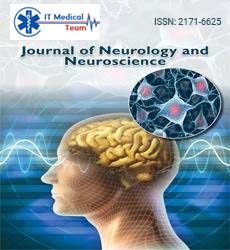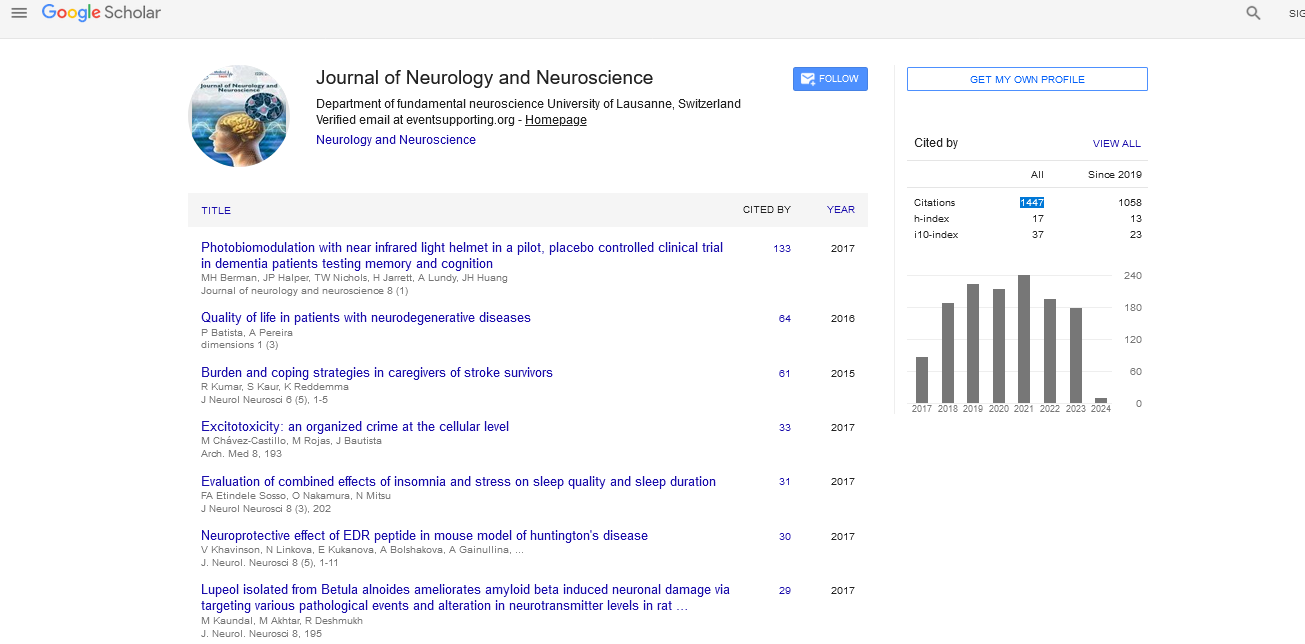Mini Review - (2023) Volume 14, Issue 1
Neuroendocrinology: Understanding the complex interactions between the brain and hormonal system
Johannes Sapolsky*
Department of Biology and Neurology, Stanford University, Stanford, CA, USA
*Correspondence:
Johannes Sapolsky, Department of Biology and Neurology, Stanford University, Stanford, CA,
USA,
Email:
Received: 31-Dec-2022, Manuscript No. ipjnn-23-13636;
Editor assigned: 03-Jan-2023, Pre QC No. P-13636;
Reviewed: 17-Jan-2023, QC No. Q-13636;
Revised: 23-Jan-2023, Manuscript No. R-13636;
Published:
31-Jan-2023
Abstract
Neuroendocrinology is a rapidly growing field that investigates
the interactions between the nervous and endocrine systems. The
hypothalamus, located at the base of the brain, plays a key role in
regulating the activity of various endocrine glands throughout the
body. The study of neuroendocrinology is critical for understanding
the mechanisms of communication and regulation between the brain
and hormonal system, and has important implications for various
disorders such as diabetes, obesity, depression, and infertility. In this
mini-review, we provide an overview of the fundamental concepts
and current research trends in neuroendocrinology, highlighting its
importance in our understanding of behavior, physiology, and health.
Keywords
Neuroendocrinology; Nervous system; Endocrine system;
Hypothalamus; Hormones; Pituitary gland; Behavior
Introduction
Neuroendocrinology is a rapidly expanding field that
investigates the interactions and communication between
the nervous and endocrine systems. The endocrine system
consists of various glands and organs throughout the body
that produce and release hormones, which are responsible
for regulating many essential physiological processes. The
nervous system, on the other hand, includes the brain
and nerves that transmit signals throughout the body.
Neuroendocrinology is concerned with understanding
the complex interactions between these two systems,
particularly the role of the hypothalamus in regulating
hormonal activity. In this mini-review, we will provide an
overview of the fundamental concepts and current research
trends in neuroendocrinology, highlighting its importance
in understanding behavior, metabolism, growth,
development, and various disorders such as diabetes,
obesity, depression, and infertility [1].
Literature Review
Research in neuroendocrinology has made significant
contributions to our understanding of the complex
interactions between the nervous and endocrine systems.
One key area of investigation is the role of the hypothalamus
in regulating hormonal activity. The hypothalamus releases
a variety of hormones that control the release of hormones
from the pituitary gland, which in turn regulates the
activity of various endocrine glands throughout the body.
The hypothalamus also plays a critical role in regulating
stress responses and maintaining homeostasis.
Recent research in neuroendocrinology has focused
on the mechanisms underlying the regulation of energy
balance and metabolism. This research has identified
several key hormones, including leptin and ghrelin, that
play important roles in regulating appetite and energy
expenditure. Dysregulation of these hormones has been
implicated in the development of obesity and related
metabolic disorders [2].
In addition to its role in regulating metabolism, the
neuroendocrine system also plays an important role in
regulating behavior and mood. For example, research
has shown that the hormone oxytocin plays a key role in
social bonding and trust, while dysregulation of the stress
hormone cortisol has been linked to depression and anxiety.
Advancements in molecular biology and imaging
technologies have allowed researchers to gain new insights into the complex mechanisms underlying neuroendocrine
regulation. For example, recent studies have used
optogenetics, a technique that allows the precise control of
neural activity using light, to investigate the role of specific
neuronal populations in regulating hormonal release.
Overall, the field of neuroendocrinology continues to
be an important area of research with broad implications
for our understanding of behavior, physiology, and health
[3].
Discussion
Research in neuroendocrinology has made significant
strides in understanding the complex interactions between
the nervous and endocrine systems. One key area of
investigation is the role of the hypothalamus in regulating
hormonal activity. Recent research has identified several key
hormones, such as leptin and ghrelin, that play important
roles in regulating appetite and energy expenditure.
Dysregulation of these hormones has been implicated in
the development of obesity and related metabolic disorders.
In addition to its role in regulating metabolism, the
neuroendocrine system also plays an important role in
regulating behavior and mood. Research has shown that
dysregulation of stress hormones, such as cortisol, has
been linked to depression and anxiety. Furthermore,
the hormone oxytocin has been found to play a key role
in social bonding and trust, and may have therapeutic
potential for treating conditions such as autism and social
anxiety disorder [4].
Advancements in molecular biology and imaging
technologies have allowed researchers to gain new
insights into the complex mechanisms underlying
neuroendocrine regulation. For example, optogenetics
has allowed researchers to investigate the role of specific
neuronal populations in regulating hormonal release. Such
advancements have the potential to lead to new treatments for a variety of disorders, from obesity to anxiety.
Despite the many advancements in the field, there are
still many unanswered questions in neuroendocrinology.
Further research is needed to fully understand the
mechanisms underlying neuroendocrine regulation and
its implications for health and disease. Additionally, the
potential use of neuroendocrine therapies for various
disorders requires further investigation and development
[5,6].
Conclusion
Neuroendocrinology is a rapidly growing field that
investigates the complex interactions between the nervous
and endocrine systems. The hypothalamus plays a key
role in regulating hormonal activity, and recent research
has identified important hormones involved in regulating
metabolism, behavior, and mood. Dysregulation of these
hormones has been implicated in various disorders, such as
obesity, depression, and anxiety. Advancements in molecular
biology and imaging technologies have allowed researchers
to gain new insights into the mechanisms underlying
neuroendocrine regulation. However, there is still much
to be discovered and further research is needed to fully
understand the implications of neuroendocrine regulation
for health and disease. Overall, neuroendocrinology has
important implications for our understanding of behavior,
physiology, and health. The continued exploration of this
field promises to uncover new therapeutic targets and
treatments for a range of disorders.
Acknowledgement
None.
Conflict of Interest
None.
References
- Chrousos GP. Stress and disorders of the stress system. Nat Rev Endocrinol. 2009; 5(7):374-381.
Google Scholar, Crossref, Indexed at
- Peterson RS, Yarram L, Schlinger BA, et al. Aromatase is pre-synaptic and sexually dimorphic in the adult zebra finch brain. Proc R Soc Lond B Biol Sci. 2005; 272(1576):2089-2096.
Google Scholar, Crossref, Indexed at
- Gold PW, Chrousos GP. Organization of the stress system and its dysregulation in melancholic and atypical depression: High vs low CRH/NE states. Mol psychiatry. 2002; 7(3):254-275.
Google Scholar, Crossref, Indexed at
- Charmandari E, Tsigos C, Chrousos G. Endocrinology of the stress response. Annu Rev Physiol. 2005 17; 67: 259-284.
Google Scholar, Crossref, Indexed at
- Diorio D, Viau V, Meaney MJ. The role of the medial prefrontal cortex (cingulate gyrus) in the regulation of hypothalamic-pituitary-adrenal responses to stress. J Neurosci. 1993; 13(9):3839-3847.
Google Scholar, Crossref, Indexed at
- Terasawa EI, Fernandez DL. Neurobiological mechanisms of the onset of puberty in primates. Endocr rev. 2001; 22(1):111-151.
Google Scholar, Crossref, Indexed at





